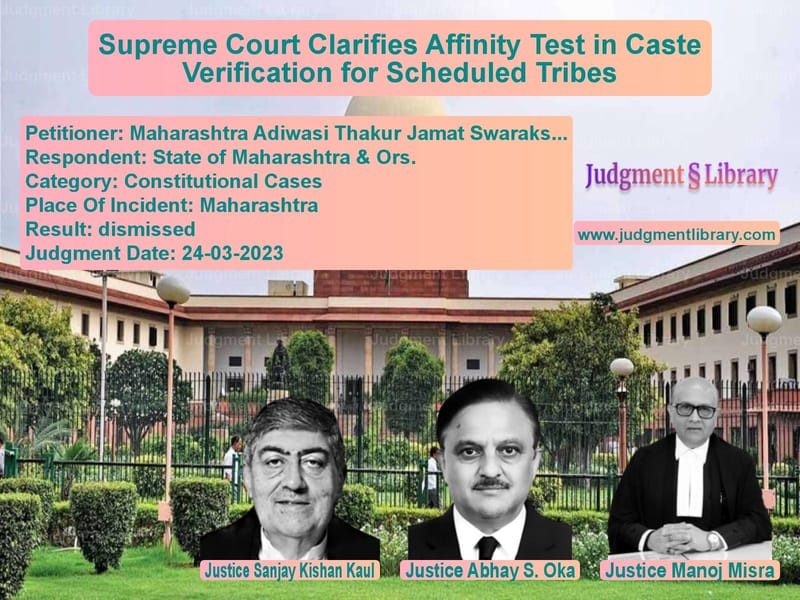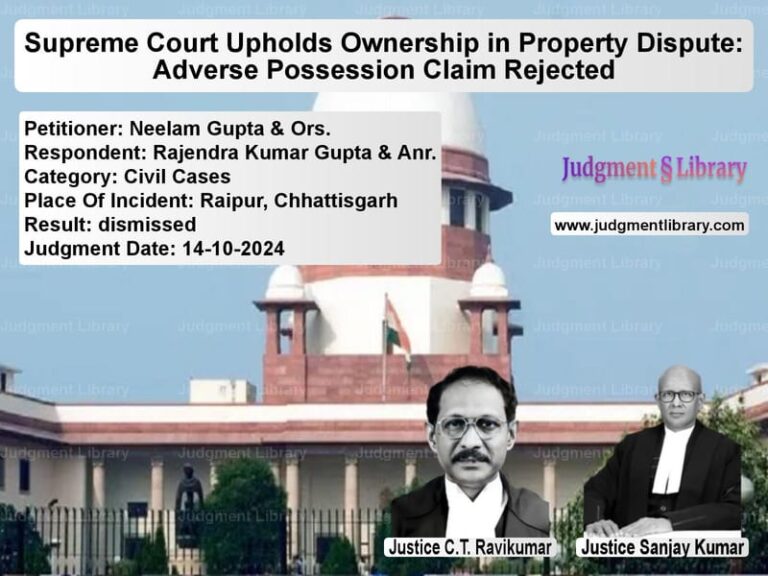Supreme Court Clarifies Affinity Test in Caste Verification for Scheduled Tribes
The case of Maharashtra Adiwasi Thakur Jamat Swarakshan Samiti v. State of Maharashtra & Ors. revolves around the crucial issue of caste verification for Scheduled Tribes in Maharashtra. The Supreme Court was tasked with determining whether the ‘Affinity Test’ should be treated as a mandatory or a supplementary tool in the verification of caste claims under the Maharashtra Scheduled Castes, Scheduled Tribes, De-notified Tribes (Vimukta Jatis), Nomadic Tribes, Other Backward Classes and Special Backward Category (Regulation of Issuance and Verification of) Caste Certificate Act, 2000 (the ‘2000 Act’).
The Supreme Court held that the affinity test is not a litmus test and should not be treated as the sole criterion for verifying caste claims. The ruling clarifies that while the affinity test can be used as a corroborative tool, caste verification must be based on a holistic assessment, including documentary evidence and historical records.
Background of the Case
The issue of verifying Scheduled Tribe status in Maharashtra has been a subject of judicial scrutiny for decades. The dispute arose from cases where individuals sought Scheduled Tribe (ST) certificates to claim benefits under reservation policies. The key questions before the Court were:
- Whether the affinity test is an essential or supplementary tool in caste verification.
- Whether caste certificates of blood relatives should automatically validate an individual’s caste claim.
- The procedural framework for referring cases to the Vigilance Cell for further investigation.
The Supreme Court examined multiple cases, including the landmark ruling in Kumari Madhuri Patil v. Addl. Commissioner, Tribal Development, which had previously laid down procedural safeguards for caste verification.
Arguments by the Parties
Arguments by the Petitioner (Maharashtra Adiwasi Thakur Jamat Swarakshan Samiti)
- The petitioners argued that if an individual has documents proving their Scheduled Tribe status from the pre-Constitution era, there is no need for further verification through an affinity test.
- The Scrutiny Committee should not reject caste claims based on failure in the affinity test, as many urban individuals may not retain their traditional cultural traits due to modernization.
- If an individual’s close blood relative has already been issued a caste validity certificate, their caste claim should be validated without further scrutiny.
Arguments by the Respondents (State of Maharashtra & Others)
- The State of Maharashtra contended that the surname ‘Thakur’ is shared by both forward and backward castes, making verification essential.
- The Scrutiny Committee should conduct a thorough examination, including an affinity test, before validating caste claims.
- Blood relatives’ caste certificates should not automatically entitle an applicant to a caste validity certificate.
- The Vigilance Cell plays a critical role in investigating fraudulent claims and should continue its verification process.
Supreme Court’s Legal Analysis
The Role of the Affinity Test
The Supreme Court ruled that the affinity test should not be treated as conclusive evidence in caste verification. The judgment stated:
“The affinity test is not a litmus test and should not be the sole criterion for deciding caste claims. It can be used to corroborate documentary evidence but must not override substantial documentary proof.”
Documentary Evidence as the Primary Basis
The Court emphasized the importance of pre-Constitution documents in verifying caste claims. It stated:
“If an applicant provides authentic and genuine documents from the pre-Constitution period proving their tribal status, there is no need for additional scrutiny through the affinity test.”
Blood Relatives’ Caste Certificates
The Supreme Court ruled that caste certificates issued to an applicant’s blood relatives should not automatically validate their caste claim. However, such certificates should be considered strong evidence if:
- The caste validity certificate was issued after proper inquiry.
- The applicant can establish a clear relationship with the blood relative.
Referral to the Vigilance Cell
The Court held that cases should not be mechanically referred to the Vigilance Cell. Instead, the Scrutiny Committee must first assess the documentary evidence before deciding on further investigation.
Final Judgment by the Supreme Court
The Supreme Court laid down the following key principles:
- The affinity test should not be mandatory in every case and should be used only as corroborative evidence.
- If an applicant produces genuine pre-Constitution documents proving their caste, further verification through an affinity test is unnecessary.
- The Scrutiny Committee must assess the entire body of evidence before referring cases to the Vigilance Cell.
- Caste validity certificates issued to an applicant’s relatives are relevant but not conclusive.
Impact of the Judgment
The ruling has significant implications for caste verification processes across India:
- Ensures Fair Verification: The judgment protects genuine tribal members from unnecessary scrutiny while preventing fraudulent claims.
- Limits Bureaucratic Hurdles: It prevents the mechanical application of the affinity test, streamlining the verification process.
- Strengthens Documentary Evidence: The emphasis on pre-Constitution documents reinforces the integrity of caste verification.
Conclusion
The Supreme Court’s decision in Maharashtra Adiwasi Thakur Jamat Swarakshan Samiti v. State of Maharashtra clarifies the role of the affinity test in caste verification. By ruling that the test should not be a mandatory or conclusive factor, the Court has ensured a more balanced and evidence-based approach to caste verification, benefiting genuine tribal members while safeguarding against fraudulent claims.
Petitioner Name: Maharashtra Adiwasi Thakur Jamat Swarakshan Samiti.Respondent Name: State of Maharashtra & Ors..Judgment By: Justice Sanjay Kishan Kaul, Justice Abhay S. Oka, Justice Manoj Misra.Place Of Incident: Maharashtra.Judgment Date: 24-03-2023.
Don’t miss out on the full details! Download the complete judgment in PDF format below and gain valuable insights instantly!
Download Judgment: maharashtra-adiwasi-vs-state-of-maharashtra-supreme-court-of-india-judgment-dated-24-03-2023.pdf
Directly Download Judgment: Directly download this Judgment
See all petitions in Fundamental Rights
See all petitions in Public Interest Litigation
See all petitions in Judgment by Sanjay Kishan Kaul
See all petitions in Judgment by Abhay S. Oka
See all petitions in Judgment by Manoj Misra
See all petitions in dismissed
See all petitions in supreme court of India judgments March 2023
See all petitions in 2023 judgments
See all posts in Constitutional Cases Category
See all allowed petitions in Constitutional Cases Category
See all Dismissed petitions in Constitutional Cases Category
See all partially allowed petitions in Constitutional Cases Category







